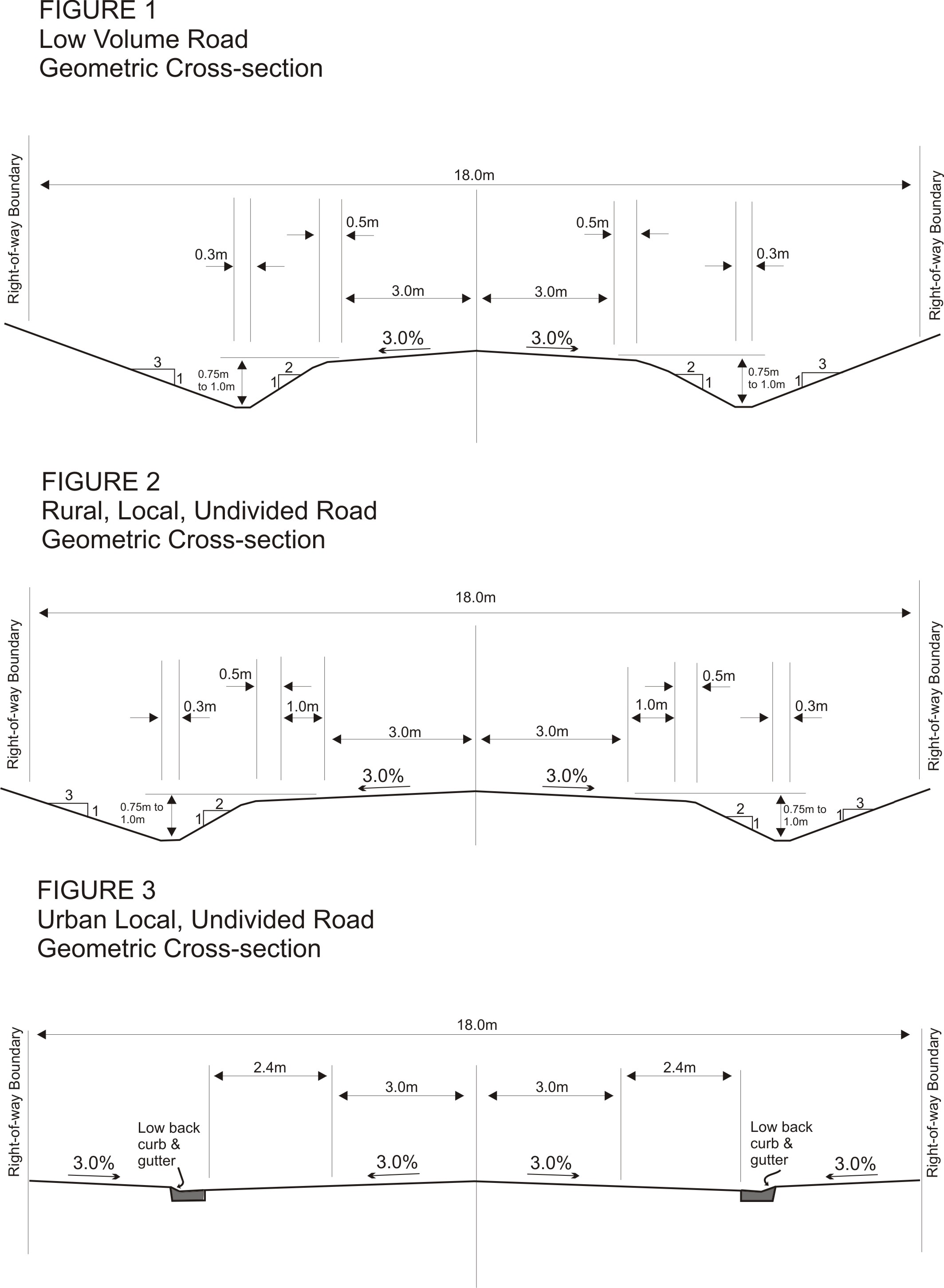Let's shed some light on your search



PURPOSE:
The purpose of Municipality of the County of Annapolis Road and Streets Standards Manual is to define Development Planning, Engineering Design and Construction Standards for the development of private and municipal roads and streets within the Municipality.
APPLICATION:
The specifications herein apply to the development of private and municipally owned streets in the Municipality of the County of Annapolis.
STREET CLASSIFICATION:
Streets and Roads shall be classified using the following method and criteria.
CLASSIFICATION
Trip generation estimates shall be based on the most recent Institute of Traffic Engineers (ITE) methods, or as an alternate, the following criteria.
GEOMETRIC STANDARDS
The following are the minimum Geometric Design Standards for Roads and Streets:
Vertical curves shall have “K” value minimums (metric calculation) as follows:
- for crests .. K (min.) = 22
- for sags ... K (min.) = 15
Figures 1, 2, 3, 4 and 5 define the Geometric Design cross-sections for the identified road / street classes.
STRUCTURAL STANDARDS
The structural cross section of private and municipal roads and streets within the Municipality of Annapolis County shall conform to that described in Figure 6.
MATERIAL AND CONSTRUCTION STANDARDS
Construction materials, procedures and finished products shall conform to the provisions of the Standard Specifications for Municipal Services, as developed and produced by the Association of Consulting Engineers of Nova Scotia and the Nova Scotia Roadbuilders Association.



The purpose of Municipality of the County of Annapolis Road and Streets Standards Manual is to define Development Planning, Engineering Design and Construction Standards for the development of private and municipal roads and streets within the Municipality.
APPLICATION:
The specifications herein apply to the development of private and municipally owned streets in the Municipality of the County of Annapolis.
STREET CLASSIFICATION:
Streets and Roads shall be classified using the following method and criteria.
CLASSIFICATION
| CRITERIA |
LOWVOLUME ROAD (LVR) |
RURAL LOCAL UNDIVIDED(RLU) |
URBAN LOCAL UNDIVIDED(ULU) |
RURAL COLLECTOR UNDIVIDED(RCU) |
URBAN COLLECTOR UNDIVIDED(UCU) |
| |
|
|
|
|
|
| Primary Service Functions |
Property Access |
Property Access |
Property Access |
Property Access & Traffic Movement |
Property Access & Traffic Movement |
| Average Daily Traffic Volume |
Less than 200 trips Per day |
200 to 1000 trips Per day |
1000 to 3000 trips Per day |
3000 to 5000 trips Per day |
More than 5000 trips Per day |
| TYPE OF DEVELOPMENT |
TRIP GENERATION UNIT RATES |
| Single Family Detached |
10 per dwelling unit (du) per day |
| Duplex Development |
8 trips per du per day |
| Townhouse Development |
6 trips per du per day |
| Apartment Buildings |
7 trips per du per day |
| Business Parks |
15 trips per 1000 square foot of Building space per day |
GEOMETRIC STANDARDS
The following are the minimum Geometric Design Standards for Roads and Streets:
| ROADCLASSIFICATION |
MAXIMUM GRADIENT |
MINIMUMSTOPPING DISTANCE |
MINIMUMCURVE RADIUS |
| LVR |
8% |
85 metres |
85 metres |
| RLU |
8% |
85 metres |
85 metres |
| ULU |
8% |
65 metres |
85 metres |
| RCU |
8% |
110 metres |
170 metres |
| UCU |
8% |
110 metres |
190 metres |
- for crests .. K (min.) = 22
- for sags ... K (min.) = 15
Figures 1, 2, 3, 4 and 5 define the Geometric Design cross-sections for the identified road / street classes.
STRUCTURAL STANDARDS
The structural cross section of private and municipal roads and streets within the Municipality of Annapolis County shall conform to that described in Figure 6.
MATERIAL AND CONSTRUCTION STANDARDS
Construction materials, procedures and finished products shall conform to the provisions of the Standard Specifications for Municipal Services, as developed and produced by the Association of Consulting Engineers of Nova Scotia and the Nova Scotia Roadbuilders Association.



Upcoming Events
| Committee of the Whole 09 Sep 2025 10:00AM |
| Special Municipal Council 09 Sep 2025 01:00PM |
| Public Hearing #1- Bridgetown SPS/LUB Amendments 09 Sep 2025 01:30PM |
| Public Hearing #2 - County Wide MPS/LUB Amendments 09 Sep 2025 01:30PM |
| Special Municipal Council 09 Sep 2025 04:00PM |
New Information to This Site
- State of Local Emergency Extended
- Navigator Program Introduced to Support Evacuees
- Evacuee Shelter Transition to Standby Status - September 4th
- West Dalhousie Wildfire: Partial Re-entry of Evacuation Order - Sept. 3, 2025
- West Dalhousie Wildfire - A message from Warden and Deputy Warden
- NS Government Matches Donations for Evacuees
- County Renews State of Local Emergency - August 29, 2025
- Heartfelt Support Amidst Reports of Structural Damage in West Dalhousie Wildfire
- West Dalhousie Evacuation Order Expanded - Morse Rd./Thorne Rd.
- Evacuee Shelter Transitions to Comfort Centre in Bridgetown
- County Renews State of Local Emergency
- Emergency Council Meeting - August 22, 1pm










